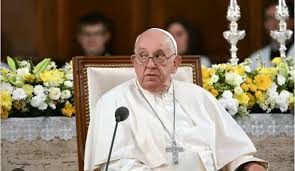In his catechesis, Pope Francis encourages us to discover God’s mercy, especially when we feel lost, just as Zacchaeus did.
Due to the Holy Father’s delicate health, there was no General Audience for the seventh consecutive Wednesday, and the text of his catechesis was distributed by the Holy See Press Office.
Dear brothers and sisters,
Let’s continue contemplating Jesus’ encounters with some of the Gospel figures. This time I’d like to focus on the figure of Zacchaeus: an episode that is particularly dear to me, because it holds a special place in my spiritual journey.
The Gospel of Luke presents Zacchaeus as someone who seems hopelessly lost. Perhaps we too sometimes feel that way: hopeless. Zacchaeus, on the other hand, will discover that the Lord was already searching for him.
Jesus, in fact, descended to Jericho, a city located below sea level, considered an image of hell, where Jesus wants to go in search of those who feel lost. And, in reality, the Risen Lord continues to descend into the hells of today, into the places of war, into the pain of the innocent, into the hearts of mothers who see their children die, into the hunger of the poor.
Zacchaeus, in a sense, has lost his way; perhaps he made wrong decisions, or perhaps life has placed him in situations he struggles to escape. In fact, Luke insists on describing this man’s characteristics: not only is he a tax collector, that is, someone who collects taxes from his fellow citizens for the Roman invaders, but he is even the chief tax collector, as if to say that his sin is multiplied.
Luke also adds that Zacchaeus is rich, implying that he has enriched himself at the expense of others, abusing his position. But all this has consequences: Zacchaeus probably feels excluded, despised by everyone.
When he learns that Jesus is passing through the city, Zacchaeus longs to see him. He doesn’t dare imagine an encounter; he would simply be able to see him from afar. However, our desires also encounter obstacles and don’t automatically come true:
Zacchaeus is short! That’s our reality; we have limits we have to deal with. And then there are the others, who sometimes don’t help us: the crowd prevents Zacchaeus from seeing Jesus. Perhaps it’s also a bit of his revenge.
But when you have a strong desire, you don’t get discouraged. You find a solution. But you have to have courage and not be ashamed; you need a bit of childlike simplicity and not worry too much about your own image. Zacchaeus, like a child, climbs a tree. It must have been a good vantage point, especially to look out unseen, hiding behind the fronds.
But with the Lord, the unexpected always happens: Jesus, when he arrives nearby, raises his gaze. Zacchaeus feels exposed and probably expects a public rebuke. The people may have expected this, but they will be disappointed: Jesus asks Zacchaeus to come down immediately, almost amazed to see him in the tree, and says to him: “I must stay at your house today!” (Luke 19:5).
God cannot pass by without seeking the lost. Luke highlights the joy in Zacchaeus’s heart. It is the joy of one who feels seen, acknowledged, and, above all, forgiven. Jesus’ gaze is not one of reproach, but of mercy. It is that mercy we sometimes struggle to accept, especially when God forgives those who, in our opinion, don’t deserve it. We grumble because we would like to limit God’s love.
In the scene at home, Zacchaeus, after hearing Jesus’ words of forgiveness, rises, as if resurrected from his death. And he rises to make a commitment: to return four times what he has stolen. This is not a price to pay, because God’s forgiveness is free, but rather a desire to imitate the One by whom he felt loved. Zacchaeus makes a commitment to which he was not obligated, but he does so because he understands that this is his way of loving. And he does so by combining Roman legislation on theft and rabbinic law on penance. Zacchaeus, then, is not only a man of desire; he is also someone who knows how to take concrete steps. His purpose is not generic or abstract, but stems precisely from his history: he has looked at his life and identified the point from which to begin his change.
Dear brothers and sisters, let us learn from Zacchaeus not to lose hope, even when we feel marginalized or unable to change. Let us cultivate our desire to see Jesus and, above all, let us allow ourselves to be found by God’s mercy, which always comes to seek us out, no matter where we are lost.



